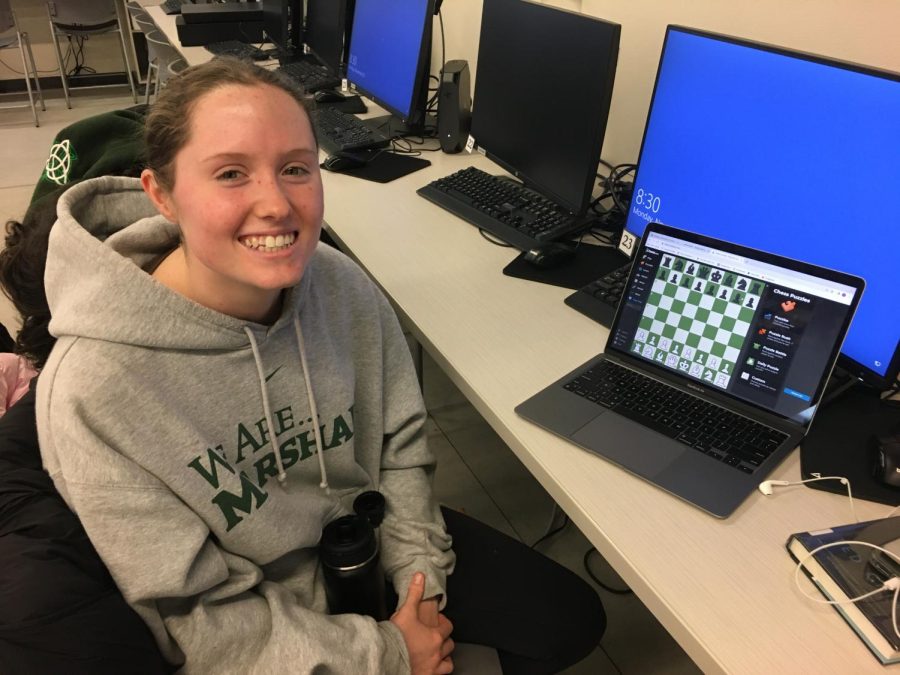Athletes flourish on fields, club rooms
Athletes splash into extracurriculars, participating in both sports, clubs
Lin
Rachel Ganz practices her chess moves. Ganz made the move away from a club sport and joined the Chess Team to fill that time
Last April, when senior Rachel Ganz quit NASA Wildcat Aquatics, a competitive swimming team, she checked the club board, and, perhaps, due to her intrigue with Queen’s Gambit, joined Chess Club.
“It was a spur-of-the-moment thing,” said Ganz, who remains a New Trier Varsity swimmer. “It was better than going straight home and doing schoolwork. I needed some sort of intermediary.”
All clubs, except class-period clubs, have no deadline to join, according to Student Activities Coordinator Stacy Kolack. That allows students to come and go whenever they please. This is very beneficial for athletes, whose schedules can change abruptly, and more flexibility allows them to incorporate more into their schedules.
Junior Marley Meyers, a runner and basketball player, is the host of The Scoop, a sports radio show. At the start of the year, Radio Club members attended a few preparatory meetings. After that, however, students worked independently.
“I can do [my show] Friday mornings before school, and it works with my schedule year-round,” said Meyers.
Sophomore Addison Yanez, a lacrosse player, participates in the new Anchor Day Art Club, one of the few clubs that take place during the school day. It is one more opportunity for students with busy schedules.
“It’s helpful for athletes because you do not have to rearrange everything else.”
Sophomore Stephen Zhao, a hockey player and DECA club member, also has found benefits to clubs.
“It teaches you time management, [which] is very important in life.”
This is also significant to club sponsors when it comes to student involvement.
“Students have a lot of options for attendance,” said ELS sponsor Julie Smith. “They can be more or less involved depending on their other extracurricular requirements, whether that be a sport or other club.”
Robotics Club sponsor Chip Finck, however, said that while students with inconsistent attendance are not penalized, they are unable to become club leaders, each of which oversees one of the four teams.
“Each group has a student leader, who has committed to being there for the entire year. We need that consistency for the group to function.”
The discussion on club leadership has extended beyond Robotics Club.
While the Global Exchange Club meets during Open Advisory, junior Lauren Robinson was unable to interview with the sponsor to become a co-head.
“I had golf practice after school and none of my free periods lined up with [the sponsor’s].”
In late September, when the golf season ended, Robinson became a co-head, three weeks after the first meeting took place. Many athletes relate to feeling forced to put something off to another date, especially since the pressure to perform exceptionally well is quite evident in New Trier culture.
The Board of Education reported that for the 2018-2019 school year – the last year this data was collected due to the COVID-19 pandemic – 88% of the student body participated in extracurricular activities, which included sports, clubs, and performing arts. 79.4% of respondents reported that their involvement in extracurricular activities contributed to their general happiness.
In some instances, athletes noted that their sport participation has, at times, put a strain on their mental health.
“There are some parts of doing a sport after school, every single day, that is very emotionally draining,” said Yanez. “As much as I love lacrosse, it makes you a bit angry at it.”
Despite her busy schedule, Yanez said she makes time for Art Club.
“[Art Club] is very therapeutic because there is no A, B, C, D, [or] fail,” said Yanez. “It [is] an opportunity to relax.”









































